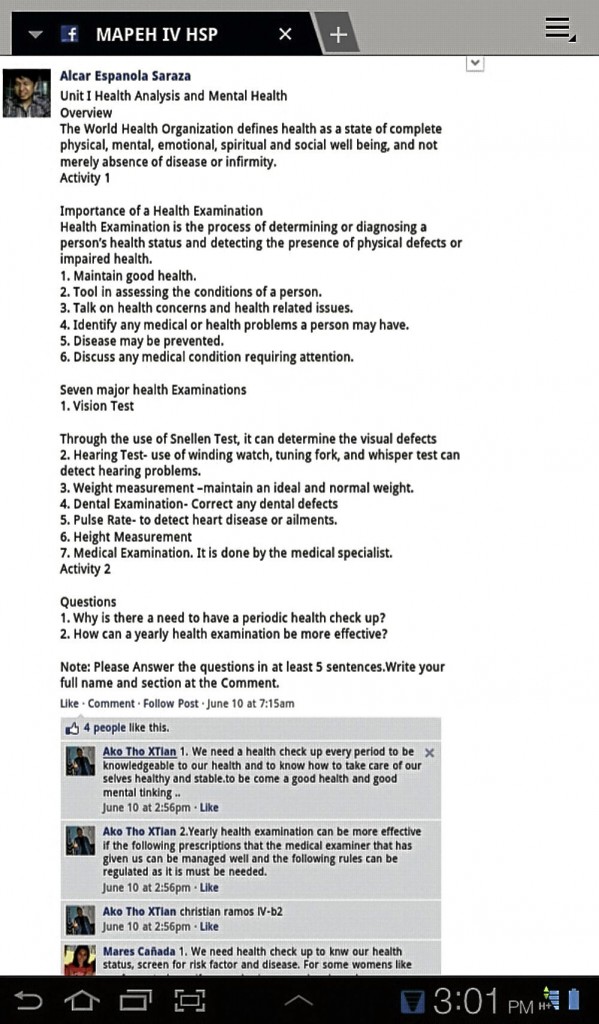Forced home study still fun in Quezon City

A sample online exchange between a teacher and home schooling students who can’t be accommodated in regular classes due to classroom shortage.
MANILA, Philippines—Something totally unplanned by the Department of Education has happened in the class of Alcar Saraza, a teacher at Batasan National High School in Quezon City who handles students forced to go into the home schooling program this year due to lack of classrooms.
Saraza, who gets to meet these students only once a week, has found an effective way to keep them updated on their lessons: A Facebook page opened especially for his home study classes.
In a Facebook group he set up for fourth-year students under his MAPEH (Music, Arts, Physical Education and Health) subjects, these “friends” can interact with him and ask questions in between their face-to-face sessions on Saturdays.
Through the social networking site, supplemental lessons, lectures and assignments are uploaded regularly for the students to access, download and study at home Mondays to Fridays.
This online approach was never on the DepEd manual and only stemmed from the need for Batasan National teachers to cope with shortages, not only of classrooms but also of teaching modules for students under the home study program.
Saraza pointed out that Facebook’s function as a social networking site can be used more productively, this time as an alternative venue of learning.
“I asked my students: Is there anyone here who doesn’t have an FB account? No one raised a hand. Obviously, everyone spends time on Facebook,” he recalled in an interview with the Inquirer last week.
The FB group he created for his MAPEH class currently has 80 students as members, who regularly comment on the lessons and occasionally post off-topic ramblings.
One of Saraza’s lessons posted last month, for example, tackled the aging process and the physical changes it entails. He gave 10 questions on the topic—and at least 12 students posted their answers.
Batasan Hills National is one of the six schools in Quezon City which started implementing a DepEd-approved home study program in June to address the problem of overcrowded campuses.
Since the school’s 112 classrooms are only good for 10,000 students, some 3,093 students who could not be accommodated are covered by the program this year.
DepEd has been implementing the program since 2000, but usually for overage or working students or transferees and never before on such a large scale in a single locality.
Dr. Corazon Rubio, superintendent of the Quezon City Division of Schools, said DepEd really encourages the use of information technology to reach more students.
“The use of FB is not something we required of the teachers. It’s okay to upload lessons on FB. In fact, we are lobbying to have more computers to promote IT in learning,” she said.
Due to budget constraints, schools encounter difficulties in the reproduction of modules, prompting teachers to adapt using the tools available, she noted. Some have resorted to the old-fashioned photocopying, for example, but it still means charging the parents at least P5 for the students’ copies.
But others like Saraza took advantage of Facebook’s popularity by creating a group where additional lessons are uploaded for students with Internet access.